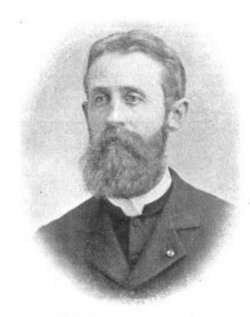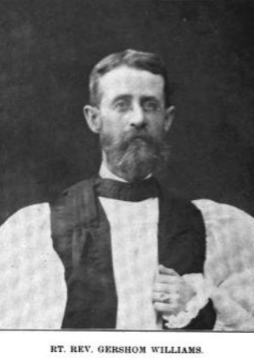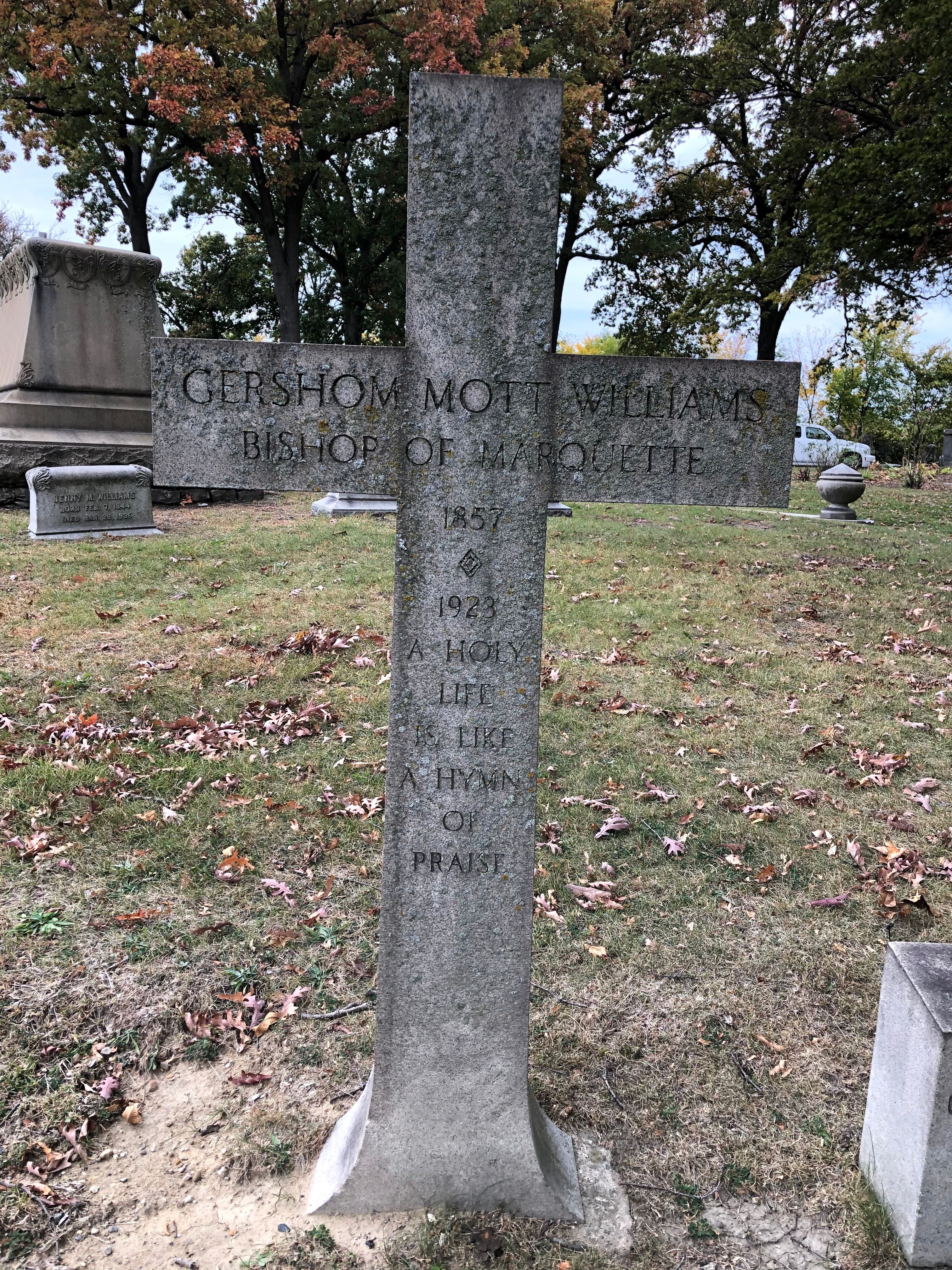Bishop Williams was born at Fort Hamilton, New York, February 11, 1857, the son of General Thomas Williams, born at Albany, New York, January 16, 1815, and of Mary Neosho Bailey, born at Fort Gibson, Indian Territory, 1835, the daughter of Joseph Bailey, army surgeon. Bishop Williams' father, Major and Brevet Brigadier General in the regular army, commanded the Second Brigade of the Army of the Gulf at the battle of Baton Rouge, Louisiana, where he was killed in action August 5, 1862. Bishop Williams acquired his early education in the Newburgh, New York, schools, where he was graduated from the Free academy in 1871. Subsequently he attended a classical school, spent a year as office boy with the Newburgh Steam Engine works, then came an extended tour in Europe in 1874-75, winning a competitive examination for a scholarship at Cornell university he entered in the fall of 1875 and remained until 1877 when he was called to Detroit, Michigan, to look after business connected with his father's estate. He entered Mr. Robert P. Tom's office and took up the study of law, being admitted to the Detroit bar in 1879. While thus engaged, he had been doing a good deal of work in connection with the Detroit Y. M. C. A. This and other religious activities influenced him to study for the Episcopal ministry.
He was ordained deacon in St. John's church, Detroit, December 26, 1880, and became curate to the rector of that church, the Rev. George Worthington, afterwards Bishop of Nebraska, the ordination to the priesthood came in 1882. During his ministry in Detroit, Bishop Williams had charge of and successfully built up St. Mathews colored church and in conjunction with this field he also had charge of the Church of the Messiah in Hamtramck, Detroit. Later, he became rector of St. George's church, Detroit, where he continued to serve until the spring of 1889. He was on temporary duty at the Cathedral in Buffalo, New York for a few months and in the fall of 1889 became Dean of All Saints Cathedral, Milwaukee, Wisconsin, remaining until his appointment in 1891 as archdeacon of Northern Michigan and rector of St. Paul's, Marquette. On the creation of the Diocese of Marquette, he became its first bishop, being consecrated in Grace church, Detroit, May 1, 1896. In 1919, because of ill health, he resigned his diocese, but remained in charge of the American Episcopal churches in Europe, having been appointed by Bishop Tuttle some years before. Bishop Williams served as chaplain of the Fourth Regiment, Michigan National Guard, from 1884 to 1886 and was chaplain of the Wisconsin Commandery of the Loyal Legion during his residence in Milwaukee. Was editor for a short time of the American Church Times. Being an accomplished linguist, he represented the American Episcopal church at a religious conference in Sweden. Both Hobart college and the University of Michigan gave him a master of arts degree and the former his degree of doctor of divinity. Another marked service of Bishop Williams to his church was in connection with the revision of the Hymnal, representing a number of years' work. He was a poet and hymnologist of no mean ability. He served for several years on the board of missions and was a member of the commission to promote the world conference on Faith and Order at the time of his death.
In 1879 Bishop Williams married Eliza Bradish Biddle, daughter of William S. Biddle of Grosse Isle, Michigan, and granddaughter of Major John Biddle, president of the first State Constitutional Convention held in Detroit in 1835. Their children are: Susan Dayton Williams, Thomas Victor Williams, Dayton Ogden Williams, Cecil H. Williams, Rhoda Williams Hyde, Margaret Biddle Williams, John Biddle Williams, Everard Mott Williams, Mary Williams Knight. Bishop Williams died in Paris, France, April 14, 1923, and is buried in Elmwood, Detroit, Michigan.
Bishop Williams was born at Fort Hamilton, New York, February 11, 1857, the son of General Thomas Williams, born at Albany, New York, January 16, 1815, and of Mary Neosho Bailey, born at Fort Gibson, Indian Territory, 1835, the daughter of Joseph Bailey, army surgeon. Bishop Williams' father, Major and Brevet Brigadier General in the regular army, commanded the Second Brigade of the Army of the Gulf at the battle of Baton Rouge, Louisiana, where he was killed in action August 5, 1862. Bishop Williams acquired his early education in the Newburgh, New York, schools, where he was graduated from the Free academy in 1871. Subsequently he attended a classical school, spent a year as office boy with the Newburgh Steam Engine works, then came an extended tour in Europe in 1874-75, winning a competitive examination for a scholarship at Cornell university he entered in the fall of 1875 and remained until 1877 when he was called to Detroit, Michigan, to look after business connected with his father's estate. He entered Mr. Robert P. Tom's office and took up the study of law, being admitted to the Detroit bar in 1879. While thus engaged, he had been doing a good deal of work in connection with the Detroit Y. M. C. A. This and other religious activities influenced him to study for the Episcopal ministry.
He was ordained deacon in St. John's church, Detroit, December 26, 1880, and became curate to the rector of that church, the Rev. George Worthington, afterwards Bishop of Nebraska, the ordination to the priesthood came in 1882. During his ministry in Detroit, Bishop Williams had charge of and successfully built up St. Mathews colored church and in conjunction with this field he also had charge of the Church of the Messiah in Hamtramck, Detroit. Later, he became rector of St. George's church, Detroit, where he continued to serve until the spring of 1889. He was on temporary duty at the Cathedral in Buffalo, New York for a few months and in the fall of 1889 became Dean of All Saints Cathedral, Milwaukee, Wisconsin, remaining until his appointment in 1891 as archdeacon of Northern Michigan and rector of St. Paul's, Marquette. On the creation of the Diocese of Marquette, he became its first bishop, being consecrated in Grace church, Detroit, May 1, 1896. In 1919, because of ill health, he resigned his diocese, but remained in charge of the American Episcopal churches in Europe, having been appointed by Bishop Tuttle some years before. Bishop Williams served as chaplain of the Fourth Regiment, Michigan National Guard, from 1884 to 1886 and was chaplain of the Wisconsin Commandery of the Loyal Legion during his residence in Milwaukee. Was editor for a short time of the American Church Times. Being an accomplished linguist, he represented the American Episcopal church at a religious conference in Sweden. Both Hobart college and the University of Michigan gave him a master of arts degree and the former his degree of doctor of divinity. Another marked service of Bishop Williams to his church was in connection with the revision of the Hymnal, representing a number of years' work. He was a poet and hymnologist of no mean ability. He served for several years on the board of missions and was a member of the commission to promote the world conference on Faith and Order at the time of his death.
In 1879 Bishop Williams married Eliza Bradish Biddle, daughter of William S. Biddle of Grosse Isle, Michigan, and granddaughter of Major John Biddle, president of the first State Constitutional Convention held in Detroit in 1835. Their children are: Susan Dayton Williams, Thomas Victor Williams, Dayton Ogden Williams, Cecil H. Williams, Rhoda Williams Hyde, Margaret Biddle Williams, John Biddle Williams, Everard Mott Williams, Mary Williams Knight. Bishop Williams died in Paris, France, April 14, 1923, and is buried in Elmwood, Detroit, Michigan.
Family Members
Sponsored by Ancestry
Advertisement
Records on Ancestry
Advertisement


















